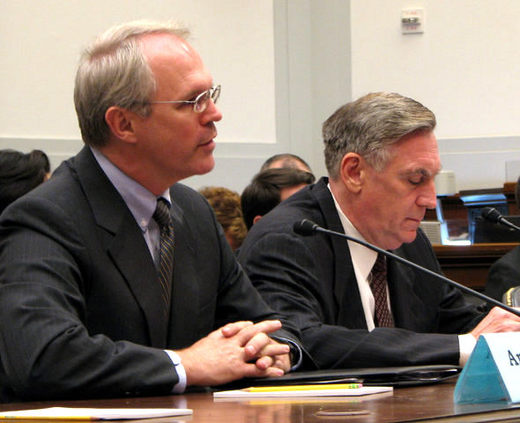 |
|
The U.S. assistant secretary of state Christopher Hill and Deputy Undersecretary of Defense Richard Lawless are at a hearing on September 27. Washington, Yonhap
|
Defense official calls increased share part of regional realignment
The United States is demanding that South Korea share an increased portion of peninsular defense spending, in light of the fact that Washington will hand over wartime military operational control on the Korean peninsula to Seoul in the near future. Deputy Undersecretary of Defense Richard P. Lawless said on September 27 local time that the current level of cost-sharing makes it difficult for the U.S. military to maintain its status quo on the peninsula. he said in a public hearing held by the U.S. House of Representatives Committee for International Relations. Lawless said that South Korea’s current share of spending, which he put at 38 percent, was insufficient. Last year, he said that the proposed additional 10 percent of funding by the South, which would amount to US$60 million, was also too little.We cut surplus flesh, cut needed flesh, he said, but now it is at the stage of cutting bone. Referring to the U.S. stance to hand over the wartime military control to South Korea by 2009, Lawless said that though seemings ambitious, it is achievable. He emphasized increasing cost-sharing for U.S. military in South Korea and offering appropriate military exercises to continue the alliance between the two nations. Currently, Seoul wants to stave off the wartime control handover until 2012. As for this timing, he warned that if it takes more than three years to hand over the wartime control, it would undermine forces of deterrence against North Korea. A working group will be formed and lead the transfer of wartime control, he added. The existing ground combat troops, Army support units, and Air Force military force will be sustained, Lawless said. However, he said the number of U.S. troops here may be reduced if a new command system is established. Lawless described the transfer of wartime control to South Korea as a natural evolvement in the wake of the realignment of U.S. troops stationed here. It is unfortunate, he said, that some parts of the South Korean government put their focus on a possible rift in the alliance. Meanwhile, Christopher Hill, U.S. assistant secretary of state, said in a seminar that Burwell B. Bell, the head of U.S. troops in South Korea, was impressed with the capability of South Korean forces.





